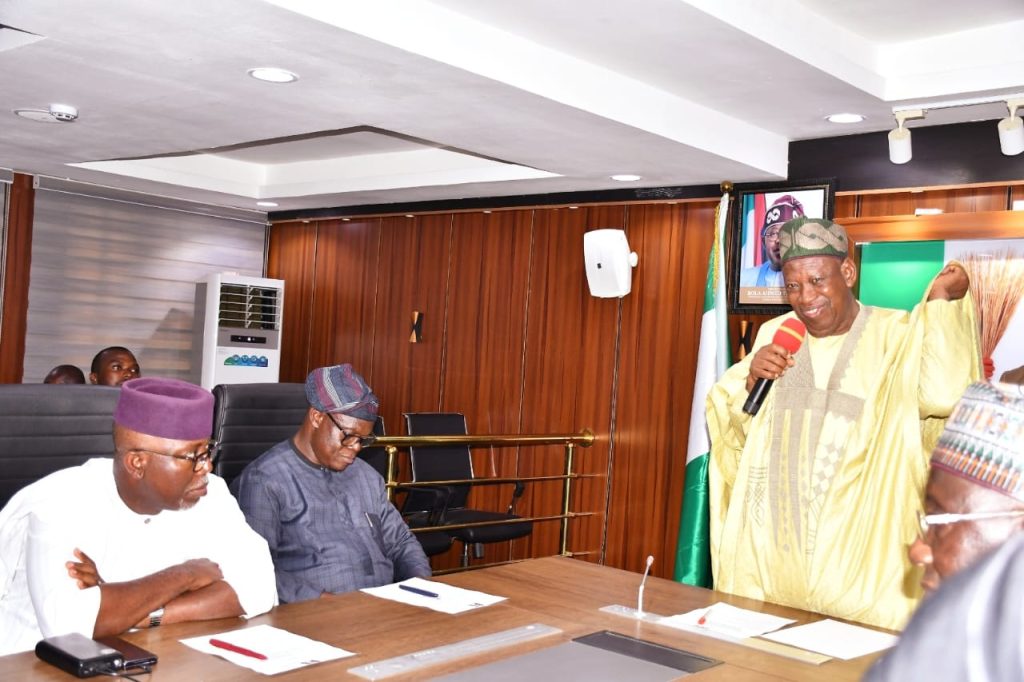Ondo’s move towards rice production
By Adetokunbo Abiola
Recently, the Ondo State Governor, Akeredolu Oluwarotimi (SAN), signed a memorandum of agreement between the Ondo State Government and the La-ruta Malaysia on rice production in Akure. While describing the exchange of the memorandum of agreement as the beginning of a sustainable partnership and collaboration, Akeredolu said it also provided an enabling environment with continuous government support.
In November 27, 2020, the governor, to maintain momentum on the administration’s agenda on food security, signed a memorandum of understanding (MOU) with two Malaysian companies on the establishment of Ondo State Integrated Rice Development Project in Ogbese, Akure North Local Government Area of Ondo State.
The two foreign companies were Mardi Corporation and La-Ruta Malaysia. While Mardi Corporation provided the technical support for the proposed project, La-ruta Malaysia provided the greater chunk of the funds required for the project.
In 2017, the Ondo State Government signed a memorandum of understanding with an agro-allied firm, Africa Red Crest (Nigeria) Limited, for the mass production of rice through the cultivation of 500 hectares of land and the establishment of a rice mill with the capacity for 37,500 tonnes per annum at the Owena Dam area of Akure.
The three events show the commitment of the Ondo State Government towards the production of rice in this part of the world. From the details of the agreements, the governments wants a sustainable partnership with companies, acquisition of technical support towards rice production, funding and the establishment of rice mills.
The agreements look shrewd. Farmers in the state already produce paddy rice, with a large expanse of land suitable for rice cultivation in the Irele local government, southern senatorial district of the state, and the rice initiative at the Ogbese/Uso axis. However, rice farmers still operate the traditional farming system, as they refuse to embrace mechanised farming, so sustainable efforts towards modern cultivation proves invaluable. I
The impetus towards rice cultivation is understandable. Rice represents one of the most consumed staples in Nigeria. In the past decade, consumption increased by 4.7%, almost four times the global consumption growth, and reached 6.4 million tonnes in 2017. As of 2011, rice accounted for 10% of household food spending, and 6.6% of total household spending. Given the importance of rice as a staple food in Nigeria, boosting its cultivation gets a high priority by the governments in the past 7 years, with a significant progress recorded in Ondo State.
For instance, in 2019, the government announced the sale of its own rice product branded as Golden Sun Rice and L’ondo. The effort came through its rice mills. The Senior Special Assistant to the State Governor on Agriculture and Agribusiness, Pastor Akin Olotu, said the product hit the market with a projection to flood the state with 165,000 bags of ten kg. The production of the branded rice, which began late in 2018, proved successful in the market and earned the state funding through a loan of N91million from the Central Bank of Nigeria to boost cultivation.
In 2017, the Fadama Additional Financing Project was set up to expand the cultivation horizon of rice beyond its level in the state. Ondo State had chosen cassava as its major crop under Fadama components, but it was later discovered that the state is also good for rice production.
“What happened is that under our Additional Financing, in the main Fadama, our people are focusing on tree crops, livestock, aquaculture and all that, but our Fadama Additional Financing is focusing on four value chains which are cassava, rice, sorghum and horticulture tomato,” said the National Project Coordinator of Fadama, Mr Tayo Adewunmi.
Globally, rice production grew at an annual average of 1.0% over the past decade, reaching 486.7 million tonnes in 2017. Most of this growth came from Asia, accounting for 89% of global output. China and India are the largest producers, each with a share of 29.6% and 22.6% of global production respectively. In the rest of the world (ex-Asia),rice production rose steadily over the past decades, accounting for 15% of total production by 2017, a marginal increase from 12% in the last two decades. Global rice consumption remains strong, driven by both population and economic growth in Asia and Africa. Over the past two decades, rice demand increased at an annual average of 1.2% to reach 481.6 4 million tonnes in 2017.
In 2015, the state government explored another form of sustainable partnership to take advantage of the increased demand globally of rice. It was during Governor Mimiko’s tenue as the state’s chief executive, and the Chairman, Wealth Creation Agency (WECA), Mrs. Bolanle Olafunmiloye said the agency in collaboration with the Ministry of Agriculture was partnering with the Mardi Malaysia on the production of rice.
Mardi commenced the cultivation of 500 hectare of land for the rice production at Owena Dam area in Igba-Oke, Ifedore Local Government Area. The initiative aimed also at boosting the internally generated revenue of the state and creating employment opportunities for the youths. WECA would be using part of the N2billion fund it got from the Central Bank of Nigeria (CBN) commercial agricultural credit to finance the project.
From all this, the state uses strategic partnerships, the establishment of rice mills, the acquisition of technical support and local and foreign funding to power its rice initiatives.
Still, it will have to find solutions to some of the problems besetting rice production. In an interview last year with Hope Newspaper in Akure, Chairman, Rice Farmers Association of Nigeria , Ondo State chapter, Mr Bukola Emmanual, stated the cost of labour in the state was quite expensive , when compared with other states in the country.
” Look at Niger State, you can get labourers that will cut job for you at the rate of N800, but here in Ondo state, if you get anybody to go to the farm with you, such will not take less than N2,000. Definitely the price will go up and it is not only rice but on all agricultural produce in the state,” he said. In other words labour costs need to be cut down.
In addition, rice farmers in the state need to stop operating the traditional farming system and embrace mechanised farming.
Emmanuel said, “You have to bulldoze the whole place before you can farm, preparation for land is where you get good yields, but we have not been preparing our lands as expected, which has been our great problem.”
Emmanuel disclosed that the association was considering helping farmers with pumps for the manual irrigation system, which he said would go a long way in ensuring good production of the grains and assist the farmers increase production.
The empirical results of a study recently provide certain evidence that climate change is significant to rice agriculture in Ondo State. Marginal change in climate variables (temperature and precipitation) negatively influenced net revenues. The degree of sensitivity however depends on whether the farm embraced irrigation or not.
“The results suggest that the use of irrigation has proved to be an effective adaptation measure to reduce the harmful effects of climate change on rice agriculture,” wrote Joshua Ajetomobi, one of the authors of the study. “Further investments are therefore required to resuscitate the irrigation systems both in terms of facilities and manpower. By and large, given the increasing investment of Nigeria government to increase rice production, wider research and deeper analyses of climate change on its agriculture should be encouraged.”
These factors seem germane as the state continues its ambitions towards rice cultivation and processing.









